Criminal Law Case Study: Attempted Murder and Dispute Resolution
VerifiedAdded on 2023/04/19
|6
|1661
|468
Case Study
AI Summary
This case study explores two distinct legal scenarios. The first involves Dan, who is accused of attempting to murder his girlfriend, outlining the process from police investigation to Crown Court prosecution, emphasizing evidence evaluation and public interest considerations. The second scenario focuses on Alisha, facing separation, child contact disputes, and unfair dismissal. It advocates for Alternative Dispute Resolution, specifically mediation, highlighting its cost-effectiveness and confidentiality compared to litigation, while also acknowledging its limitations regarding legal authority and potential for deadlock. Desklib offers a wealth of similar solved assignments and study resources for students.
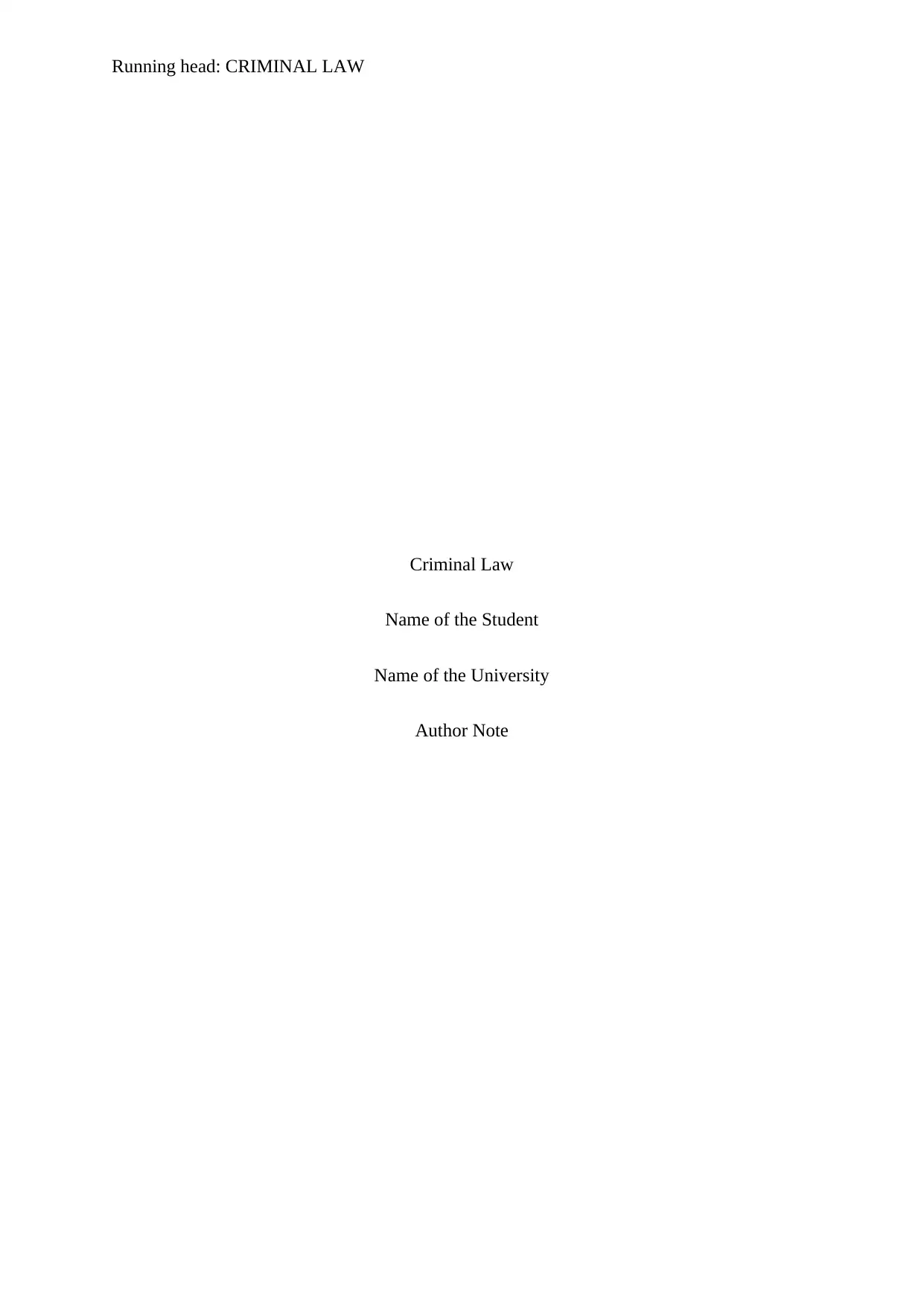
Running head: CRIMINAL LAW
Criminal Law
Name of the Student
Name of the University
Author Note
Criminal Law
Name of the Student
Name of the University
Author Note
Paraphrase This Document
Need a fresh take? Get an instant paraphrase of this document with our AI Paraphraser
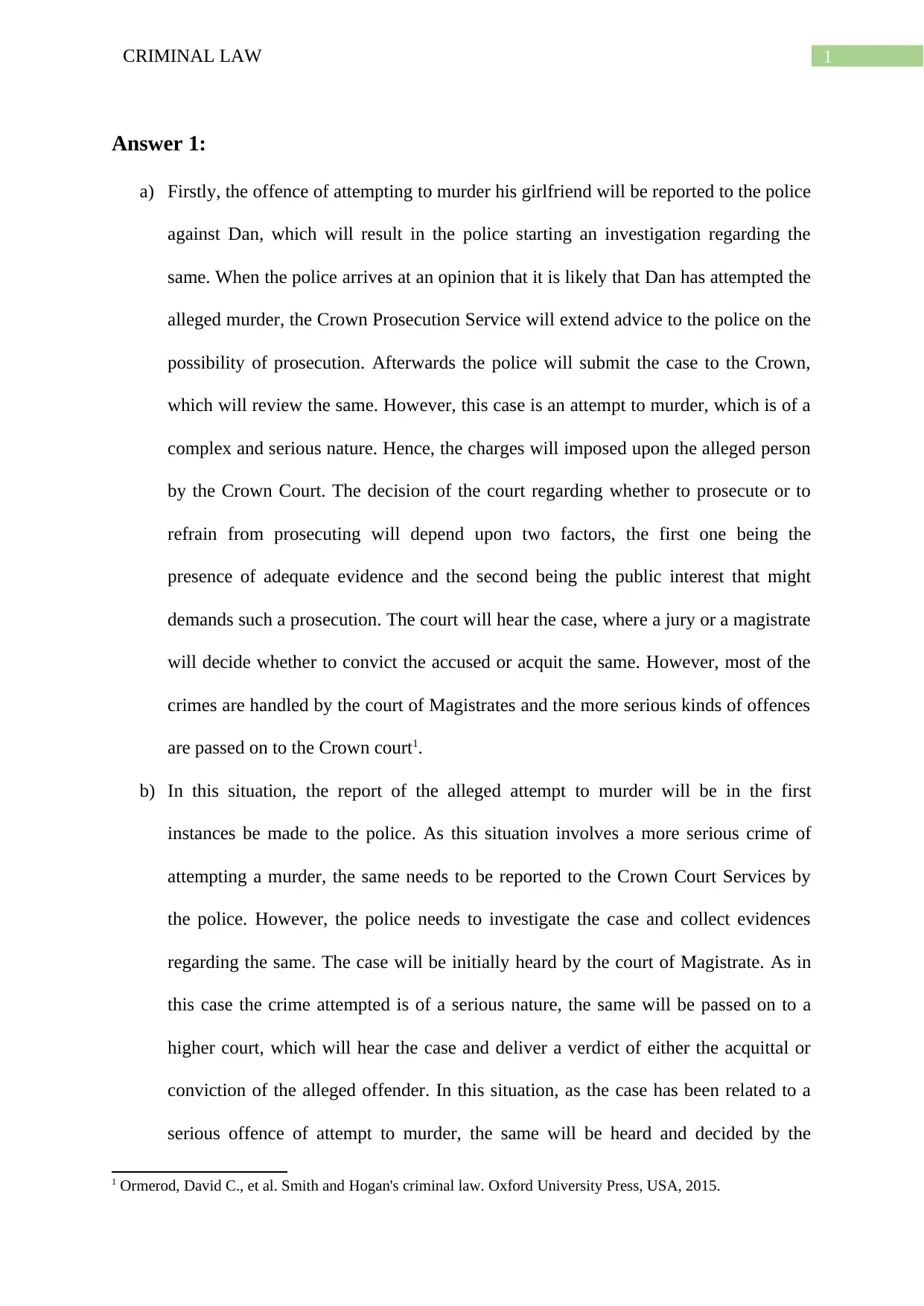
1CRIMINAL LAW
Answer 1:
a) Firstly, the offence of attempting to murder his girlfriend will be reported to the police
against Dan, which will result in the police starting an investigation regarding the
same. When the police arrives at an opinion that it is likely that Dan has attempted the
alleged murder, the Crown Prosecution Service will extend advice to the police on the
possibility of prosecution. Afterwards the police will submit the case to the Crown,
which will review the same. However, this case is an attempt to murder, which is of a
complex and serious nature. Hence, the charges will imposed upon the alleged person
by the Crown Court. The decision of the court regarding whether to prosecute or to
refrain from prosecuting will depend upon two factors, the first one being the
presence of adequate evidence and the second being the public interest that might
demands such a prosecution. The court will hear the case, where a jury or a magistrate
will decide whether to convict the accused or acquit the same. However, most of the
crimes are handled by the court of Magistrates and the more serious kinds of offences
are passed on to the Crown court1.
b) In this situation, the report of the alleged attempt to murder will be in the first
instances be made to the police. As this situation involves a more serious crime of
attempting a murder, the same needs to be reported to the Crown Court Services by
the police. However, the police needs to investigate the case and collect evidences
regarding the same. The case will be initially heard by the court of Magistrate. As in
this case the crime attempted is of a serious nature, the same will be passed on to a
higher court, which will hear the case and deliver a verdict of either the acquittal or
conviction of the alleged offender. In this situation, as the case has been related to a
serious offence of attempt to murder, the same will be heard and decided by the
1 Ormerod, David C., et al. Smith and Hogan's criminal law. Oxford University Press, USA, 2015.
Answer 1:
a) Firstly, the offence of attempting to murder his girlfriend will be reported to the police
against Dan, which will result in the police starting an investigation regarding the
same. When the police arrives at an opinion that it is likely that Dan has attempted the
alleged murder, the Crown Prosecution Service will extend advice to the police on the
possibility of prosecution. Afterwards the police will submit the case to the Crown,
which will review the same. However, this case is an attempt to murder, which is of a
complex and serious nature. Hence, the charges will imposed upon the alleged person
by the Crown Court. The decision of the court regarding whether to prosecute or to
refrain from prosecuting will depend upon two factors, the first one being the
presence of adequate evidence and the second being the public interest that might
demands such a prosecution. The court will hear the case, where a jury or a magistrate
will decide whether to convict the accused or acquit the same. However, most of the
crimes are handled by the court of Magistrates and the more serious kinds of offences
are passed on to the Crown court1.
b) In this situation, the report of the alleged attempt to murder will be in the first
instances be made to the police. As this situation involves a more serious crime of
attempting a murder, the same needs to be reported to the Crown Court Services by
the police. However, the police needs to investigate the case and collect evidences
regarding the same. The case will be initially heard by the court of Magistrate. As in
this case the crime attempted is of a serious nature, the same will be passed on to a
higher court, which will hear the case and deliver a verdict of either the acquittal or
conviction of the alleged offender. In this situation, as the case has been related to a
serious offence of attempt to murder, the same will be heard and decided by the
1 Ormerod, David C., et al. Smith and Hogan's criminal law. Oxford University Press, USA, 2015.
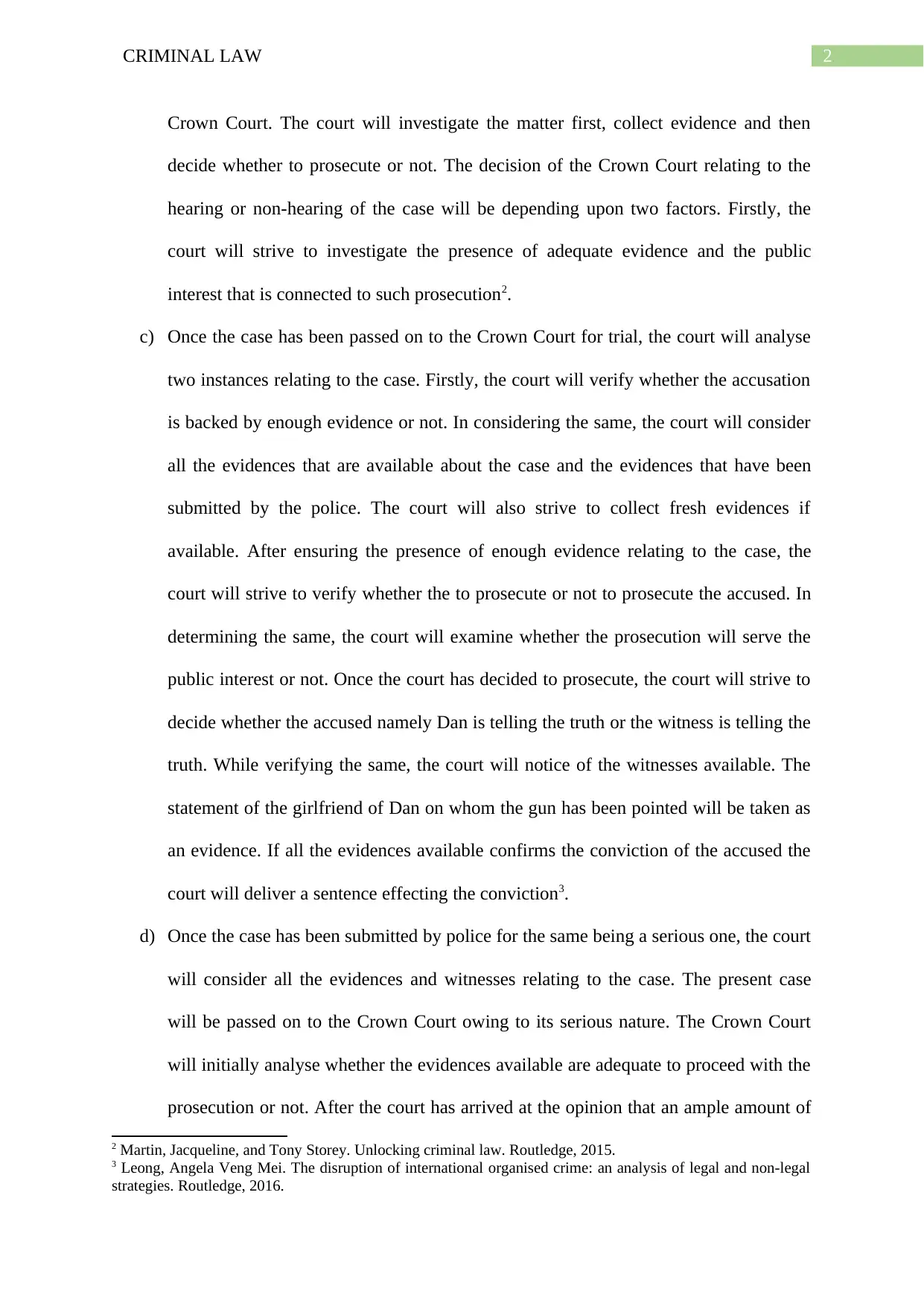
2CRIMINAL LAW
Crown Court. The court will investigate the matter first, collect evidence and then
decide whether to prosecute or not. The decision of the Crown Court relating to the
hearing or non-hearing of the case will be depending upon two factors. Firstly, the
court will strive to investigate the presence of adequate evidence and the public
interest that is connected to such prosecution2.
c) Once the case has been passed on to the Crown Court for trial, the court will analyse
two instances relating to the case. Firstly, the court will verify whether the accusation
is backed by enough evidence or not. In considering the same, the court will consider
all the evidences that are available about the case and the evidences that have been
submitted by the police. The court will also strive to collect fresh evidences if
available. After ensuring the presence of enough evidence relating to the case, the
court will strive to verify whether the to prosecute or not to prosecute the accused. In
determining the same, the court will examine whether the prosecution will serve the
public interest or not. Once the court has decided to prosecute, the court will strive to
decide whether the accused namely Dan is telling the truth or the witness is telling the
truth. While verifying the same, the court will notice of the witnesses available. The
statement of the girlfriend of Dan on whom the gun has been pointed will be taken as
an evidence. If all the evidences available confirms the conviction of the accused the
court will deliver a sentence effecting the conviction3.
d) Once the case has been submitted by police for the same being a serious one, the court
will consider all the evidences and witnesses relating to the case. The present case
will be passed on to the Crown Court owing to its serious nature. The Crown Court
will initially analyse whether the evidences available are adequate to proceed with the
prosecution or not. After the court has arrived at the opinion that an ample amount of
2 Martin, Jacqueline, and Tony Storey. Unlocking criminal law. Routledge, 2015.
3 Leong, Angela Veng Mei. The disruption of international organised crime: an analysis of legal and non-legal
strategies. Routledge, 2016.
Crown Court. The court will investigate the matter first, collect evidence and then
decide whether to prosecute or not. The decision of the Crown Court relating to the
hearing or non-hearing of the case will be depending upon two factors. Firstly, the
court will strive to investigate the presence of adequate evidence and the public
interest that is connected to such prosecution2.
c) Once the case has been passed on to the Crown Court for trial, the court will analyse
two instances relating to the case. Firstly, the court will verify whether the accusation
is backed by enough evidence or not. In considering the same, the court will consider
all the evidences that are available about the case and the evidences that have been
submitted by the police. The court will also strive to collect fresh evidences if
available. After ensuring the presence of enough evidence relating to the case, the
court will strive to verify whether the to prosecute or not to prosecute the accused. In
determining the same, the court will examine whether the prosecution will serve the
public interest or not. Once the court has decided to prosecute, the court will strive to
decide whether the accused namely Dan is telling the truth or the witness is telling the
truth. While verifying the same, the court will notice of the witnesses available. The
statement of the girlfriend of Dan on whom the gun has been pointed will be taken as
an evidence. If all the evidences available confirms the conviction of the accused the
court will deliver a sentence effecting the conviction3.
d) Once the case has been submitted by police for the same being a serious one, the court
will consider all the evidences and witnesses relating to the case. The present case
will be passed on to the Crown Court owing to its serious nature. The Crown Court
will initially analyse whether the evidences available are adequate to proceed with the
prosecution or not. After the court has arrived at the opinion that an ample amount of
2 Martin, Jacqueline, and Tony Storey. Unlocking criminal law. Routledge, 2015.
3 Leong, Angela Veng Mei. The disruption of international organised crime: an analysis of legal and non-legal
strategies. Routledge, 2016.
⊘ This is a preview!⊘
Do you want full access?
Subscribe today to unlock all pages.

Trusted by 1+ million students worldwide
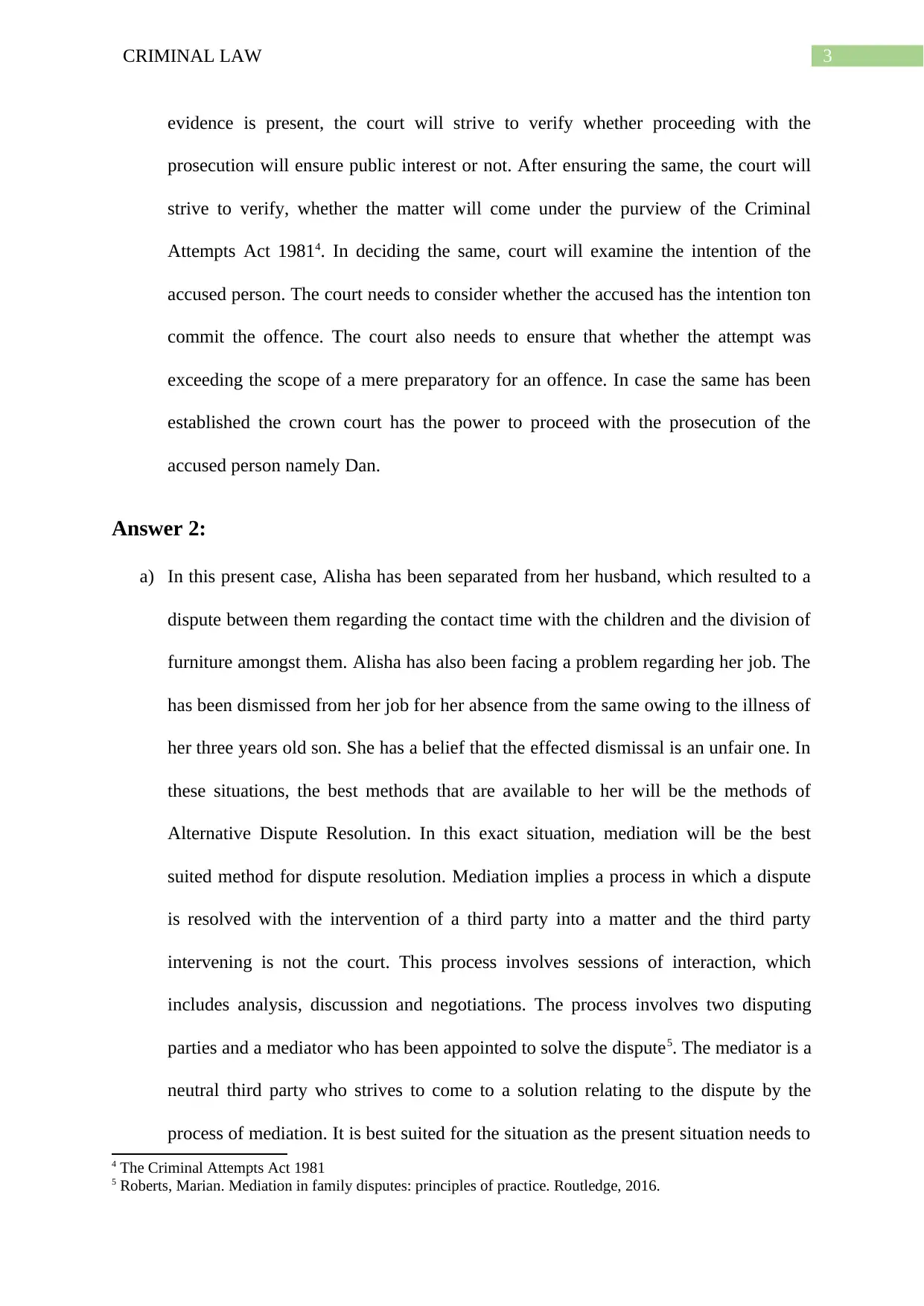
3CRIMINAL LAW
evidence is present, the court will strive to verify whether proceeding with the
prosecution will ensure public interest or not. After ensuring the same, the court will
strive to verify, whether the matter will come under the purview of the Criminal
Attempts Act 19814. In deciding the same, court will examine the intention of the
accused person. The court needs to consider whether the accused has the intention ton
commit the offence. The court also needs to ensure that whether the attempt was
exceeding the scope of a mere preparatory for an offence. In case the same has been
established the crown court has the power to proceed with the prosecution of the
accused person namely Dan.
Answer 2:
a) In this present case, Alisha has been separated from her husband, which resulted to a
dispute between them regarding the contact time with the children and the division of
furniture amongst them. Alisha has also been facing a problem regarding her job. The
has been dismissed from her job for her absence from the same owing to the illness of
her three years old son. She has a belief that the effected dismissal is an unfair one. In
these situations, the best methods that are available to her will be the methods of
Alternative Dispute Resolution. In this exact situation, mediation will be the best
suited method for dispute resolution. Mediation implies a process in which a dispute
is resolved with the intervention of a third party into a matter and the third party
intervening is not the court. This process involves sessions of interaction, which
includes analysis, discussion and negotiations. The process involves two disputing
parties and a mediator who has been appointed to solve the dispute5. The mediator is a
neutral third party who strives to come to a solution relating to the dispute by the
process of mediation. It is best suited for the situation as the present situation needs to
4 The Criminal Attempts Act 1981
5 Roberts, Marian. Mediation in family disputes: principles of practice. Routledge, 2016.
evidence is present, the court will strive to verify whether proceeding with the
prosecution will ensure public interest or not. After ensuring the same, the court will
strive to verify, whether the matter will come under the purview of the Criminal
Attempts Act 19814. In deciding the same, court will examine the intention of the
accused person. The court needs to consider whether the accused has the intention ton
commit the offence. The court also needs to ensure that whether the attempt was
exceeding the scope of a mere preparatory for an offence. In case the same has been
established the crown court has the power to proceed with the prosecution of the
accused person namely Dan.
Answer 2:
a) In this present case, Alisha has been separated from her husband, which resulted to a
dispute between them regarding the contact time with the children and the division of
furniture amongst them. Alisha has also been facing a problem regarding her job. The
has been dismissed from her job for her absence from the same owing to the illness of
her three years old son. She has a belief that the effected dismissal is an unfair one. In
these situations, the best methods that are available to her will be the methods of
Alternative Dispute Resolution. In this exact situation, mediation will be the best
suited method for dispute resolution. Mediation implies a process in which a dispute
is resolved with the intervention of a third party into a matter and the third party
intervening is not the court. This process involves sessions of interaction, which
includes analysis, discussion and negotiations. The process involves two disputing
parties and a mediator who has been appointed to solve the dispute5. The mediator is a
neutral third party who strives to come to a solution relating to the dispute by the
process of mediation. It is best suited for the situation as the present situation needs to
4 The Criminal Attempts Act 1981
5 Roberts, Marian. Mediation in family disputes: principles of practice. Routledge, 2016.
Paraphrase This Document
Need a fresh take? Get an instant paraphrase of this document with our AI Paraphraser
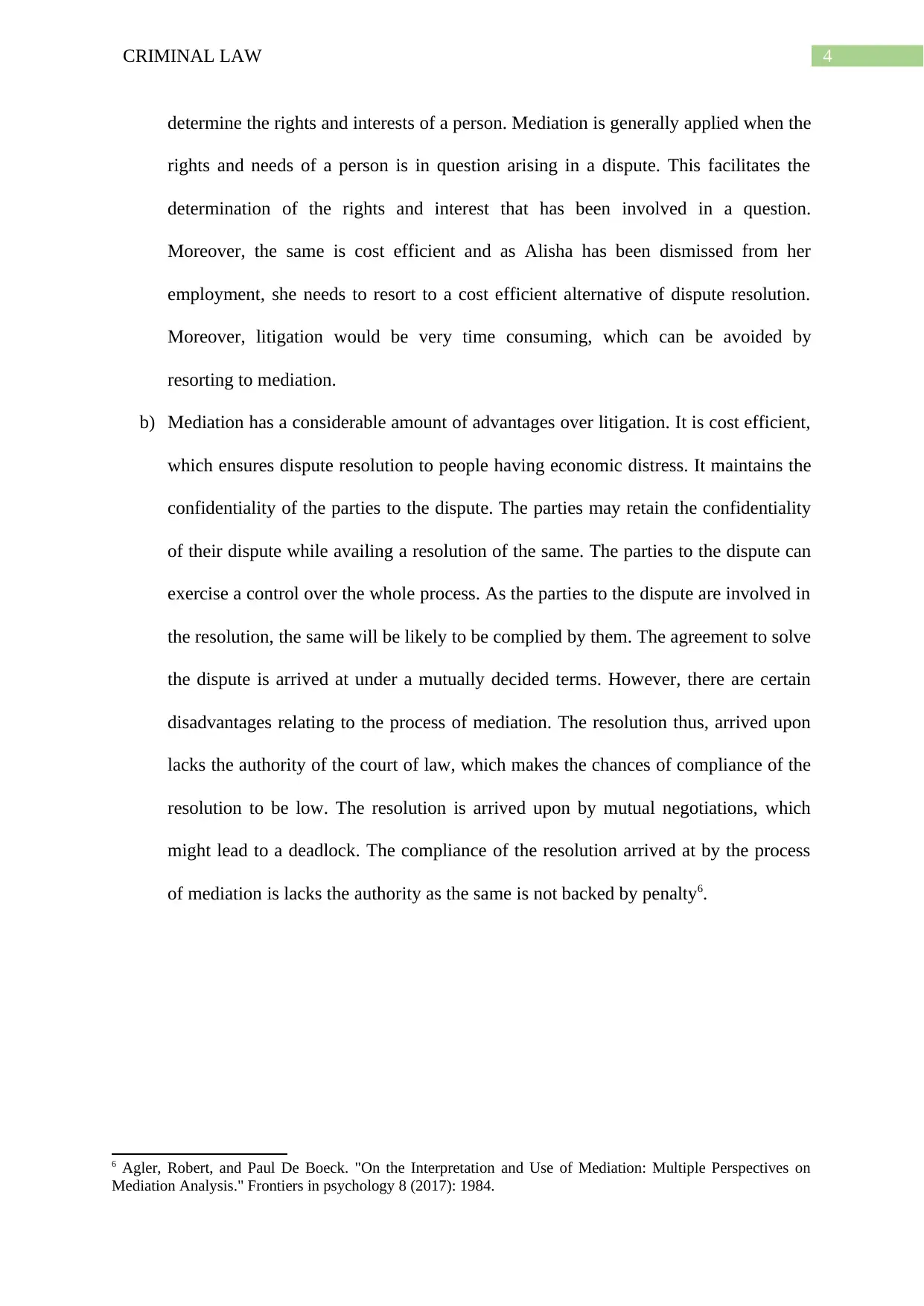
4CRIMINAL LAW
determine the rights and interests of a person. Mediation is generally applied when the
rights and needs of a person is in question arising in a dispute. This facilitates the
determination of the rights and interest that has been involved in a question.
Moreover, the same is cost efficient and as Alisha has been dismissed from her
employment, she needs to resort to a cost efficient alternative of dispute resolution.
Moreover, litigation would be very time consuming, which can be avoided by
resorting to mediation.
b) Mediation has a considerable amount of advantages over litigation. It is cost efficient,
which ensures dispute resolution to people having economic distress. It maintains the
confidentiality of the parties to the dispute. The parties may retain the confidentiality
of their dispute while availing a resolution of the same. The parties to the dispute can
exercise a control over the whole process. As the parties to the dispute are involved in
the resolution, the same will be likely to be complied by them. The agreement to solve
the dispute is arrived at under a mutually decided terms. However, there are certain
disadvantages relating to the process of mediation. The resolution thus, arrived upon
lacks the authority of the court of law, which makes the chances of compliance of the
resolution to be low. The resolution is arrived upon by mutual negotiations, which
might lead to a deadlock. The compliance of the resolution arrived at by the process
of mediation is lacks the authority as the same is not backed by penalty6.
6 Agler, Robert, and Paul De Boeck. "On the Interpretation and Use of Mediation: Multiple Perspectives on
Mediation Analysis." Frontiers in psychology 8 (2017): 1984.
determine the rights and interests of a person. Mediation is generally applied when the
rights and needs of a person is in question arising in a dispute. This facilitates the
determination of the rights and interest that has been involved in a question.
Moreover, the same is cost efficient and as Alisha has been dismissed from her
employment, she needs to resort to a cost efficient alternative of dispute resolution.
Moreover, litigation would be very time consuming, which can be avoided by
resorting to mediation.
b) Mediation has a considerable amount of advantages over litigation. It is cost efficient,
which ensures dispute resolution to people having economic distress. It maintains the
confidentiality of the parties to the dispute. The parties may retain the confidentiality
of their dispute while availing a resolution of the same. The parties to the dispute can
exercise a control over the whole process. As the parties to the dispute are involved in
the resolution, the same will be likely to be complied by them. The agreement to solve
the dispute is arrived at under a mutually decided terms. However, there are certain
disadvantages relating to the process of mediation. The resolution thus, arrived upon
lacks the authority of the court of law, which makes the chances of compliance of the
resolution to be low. The resolution is arrived upon by mutual negotiations, which
might lead to a deadlock. The compliance of the resolution arrived at by the process
of mediation is lacks the authority as the same is not backed by penalty6.
6 Agler, Robert, and Paul De Boeck. "On the Interpretation and Use of Mediation: Multiple Perspectives on
Mediation Analysis." Frontiers in psychology 8 (2017): 1984.
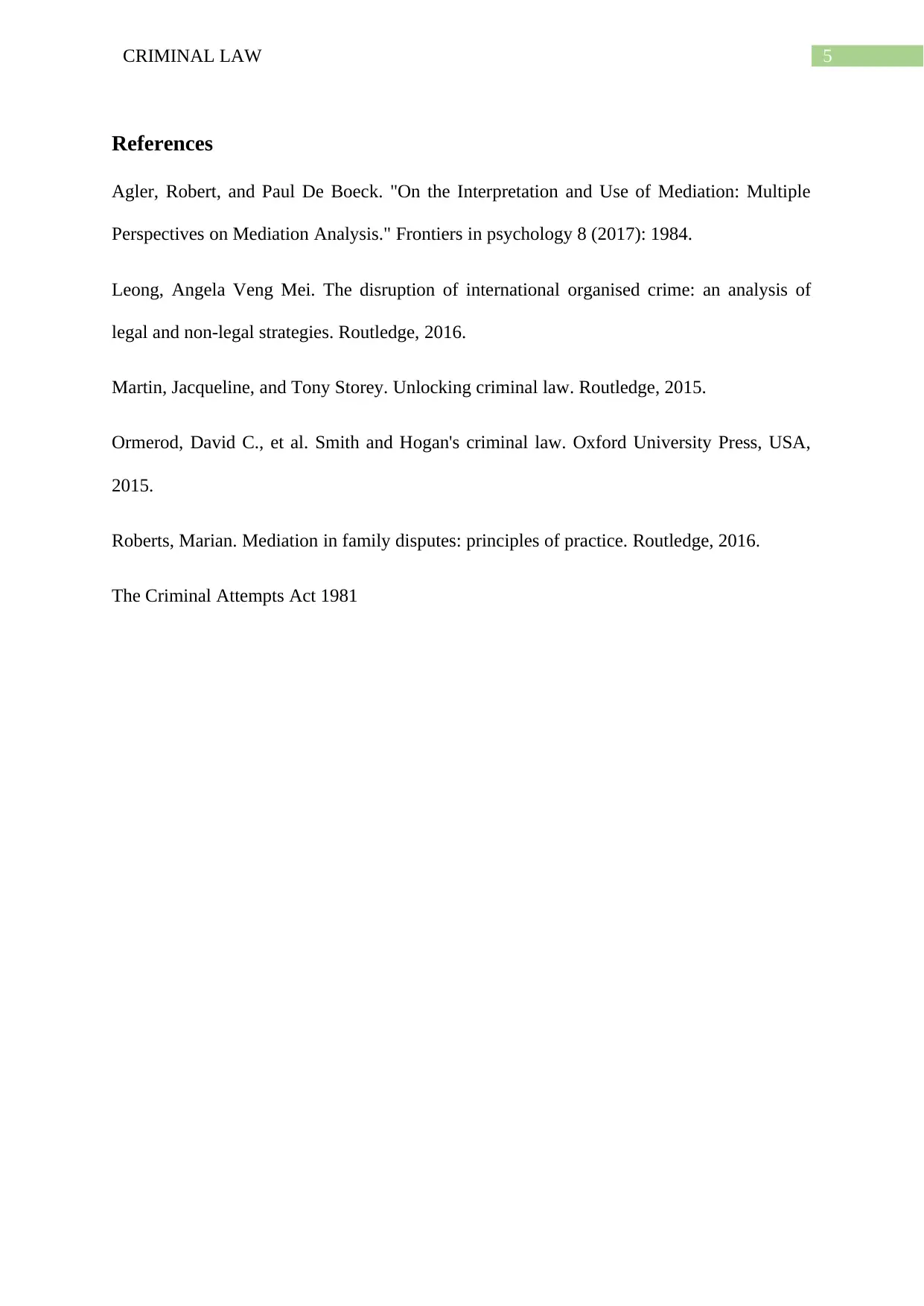
5CRIMINAL LAW
References
Agler, Robert, and Paul De Boeck. "On the Interpretation and Use of Mediation: Multiple
Perspectives on Mediation Analysis." Frontiers in psychology 8 (2017): 1984.
Leong, Angela Veng Mei. The disruption of international organised crime: an analysis of
legal and non-legal strategies. Routledge, 2016.
Martin, Jacqueline, and Tony Storey. Unlocking criminal law. Routledge, 2015.
Ormerod, David C., et al. Smith and Hogan's criminal law. Oxford University Press, USA,
2015.
Roberts, Marian. Mediation in family disputes: principles of practice. Routledge, 2016.
The Criminal Attempts Act 1981
References
Agler, Robert, and Paul De Boeck. "On the Interpretation and Use of Mediation: Multiple
Perspectives on Mediation Analysis." Frontiers in psychology 8 (2017): 1984.
Leong, Angela Veng Mei. The disruption of international organised crime: an analysis of
legal and non-legal strategies. Routledge, 2016.
Martin, Jacqueline, and Tony Storey. Unlocking criminal law. Routledge, 2015.
Ormerod, David C., et al. Smith and Hogan's criminal law. Oxford University Press, USA,
2015.
Roberts, Marian. Mediation in family disputes: principles of practice. Routledge, 2016.
The Criminal Attempts Act 1981
⊘ This is a preview!⊘
Do you want full access?
Subscribe today to unlock all pages.

Trusted by 1+ million students worldwide
1 out of 6
Related Documents
Your All-in-One AI-Powered Toolkit for Academic Success.
+13062052269
info@desklib.com
Available 24*7 on WhatsApp / Email
![[object Object]](/_next/static/media/star-bottom.7253800d.svg)
Unlock your academic potential
Copyright © 2020–2026 A2Z Services. All Rights Reserved. Developed and managed by ZUCOL.





